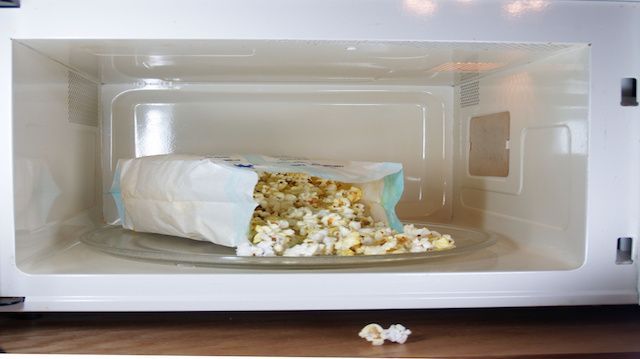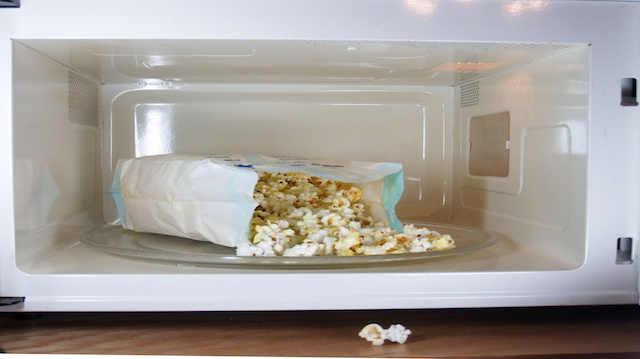
As if the ingredients found in commercial pizza weren’t already unhealthy enough, a recent U.S. Food and Drug Administration (FDA) ruling has revealed that even pizza boxes themselves may be harmful to human health.
Specifically, the FDA has banned three chemicals used to coat pizza boxes, microwave popcorn bags, and other food packaging. The decision came after pressure from health and environmental groups, including the Breast Cancer Fund, the Center for Food Safety, and the Environmental Working Group (EWG). The FDA stated that the ban was put in place because there is “no longer a reasonable certainty of no harm.”
The three banned substances are part of a class of chemicals called perfluorinated compounds, or PFCs. Designed to repel grease and water, PFCs are also used in nonstick cookware, and thousands of other stain-resistant and waterproof products, including carpeting and even clothing.
Although the ban is new, the EPA actually classified this group of chemicals as a “likely human carcinogen” almost 10 years ago. PFCs are linked to cancer, infertility, and lower birth weight in humans. PFCs have also been linked to liver damage, immune disruption, endocrine disruption, and developmental defects in animal studies. These chemicals can remain in the human body for years, and have been found in the blood of 98 percent of Americans, as well as in the drinking water of 27 states.
Considering that the toxicity of PFCs has been well known for some time now, it’s concerning that the FDA has only just decided to ban them. As Ken Cook, the president of the Environmental Working Group said:
“This is another egregious example of how, all too often, regulatory actions under the nation’s broken chemical laws are too little and too late to protect Americans’ health. Congress needs to ensure that chemicals that make their way into food, either as deliberate additives or as contaminants from packaging and other outside sources, are thoroughly investigated.”
 Additionally, in some ways the ban seems more symbolic than protective, as the three banned chemicals have not even been produced in the U.S. since 2011, when top American chemical companies completed phasing out their use. However, the FDA has since approved dozens of other PFCs for use in food packaging, the safety of which is still questionable.
Additionally, in some ways the ban seems more symbolic than protective, as the three banned chemicals have not even been produced in the U.S. since 2011, when top American chemical companies completed phasing out their use. However, the FDA has since approved dozens of other PFCs for use in food packaging, the safety of which is still questionable.
“We know very little about the safety of these next-generation PFCs in food wrappers,” said EWG Senior Scientist David Andrews, who analyzed the more recent FDA approvals. “But their chemical structure is very similar to the ones that have been phased out, and the very limited safety testing that has been done suggests they may have some of the same health hazards.”
Because the FDA does not require that chemicals be proven safe before they are added to food, packaging, and other products, we need to educate ourselves on how to avoid PFCs, and other potentially harmful chemicals like them.
To reduce PFC exposure:
- Avoid commercially packed food, such as french fries, pizza, and greasy sandwiches, which are often sold in containers or wrapped with PFC-coated paper. Avoiding processed foods like these will also help your health in other ways!
- Avoid getting new carpet and furniture stain-proofed, and use covers for high-contact items like couches if they have been treated.
- When buying clothes, check for Teflon® or Scotchgard™ tags and avoid items marketed as stainproof or water-resistant.
- Use stainless steel or ceramic cookware rather than nonstick cookware.
- Use real plates instead of paper. This will also help the environment!
- Pop popcorn on the stove top instead of in the microwave.
- Use nontoxic food containers such as glass and stainless steel.
What do you think? Should chemicals be proven safe before they are added to our food and other products?
—The Alternative Daily
Sources:
http://www.ewg.org/sites/default/files/EWG_pfcguide.pdf
http://www.ewg.org/research/poisoned-legacy/pfc-contamination-no-place-hide
http://www.cleanandhealthyme.org/bodyofevidencereport/thechemicals/pfcsstainresistantteflonchemicals/tabid/98/default.aspx

